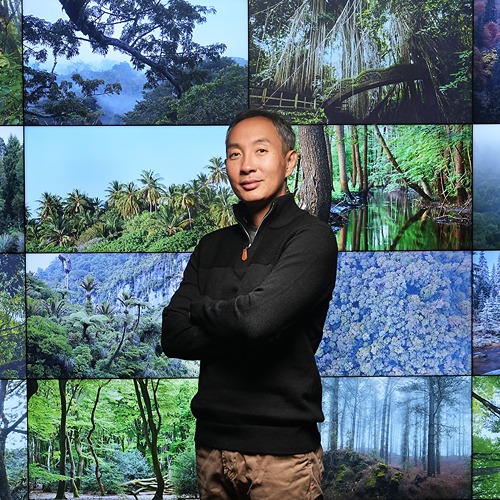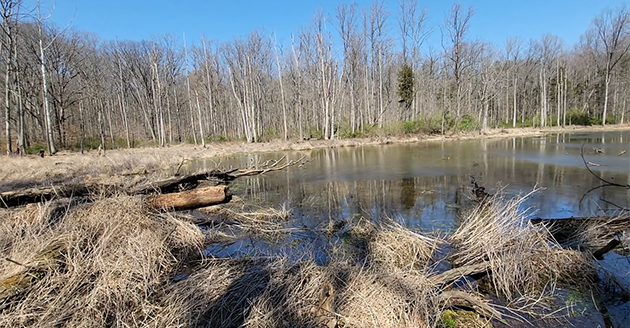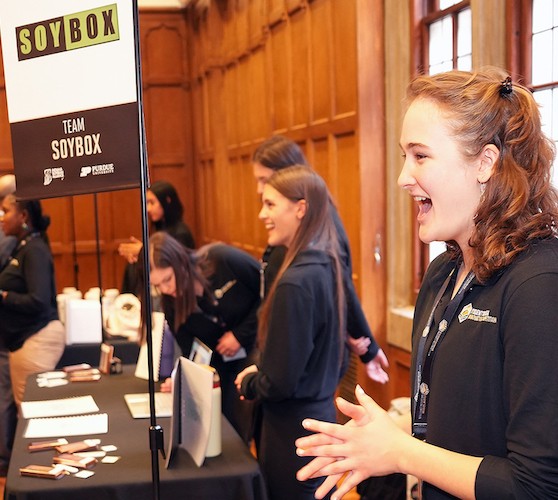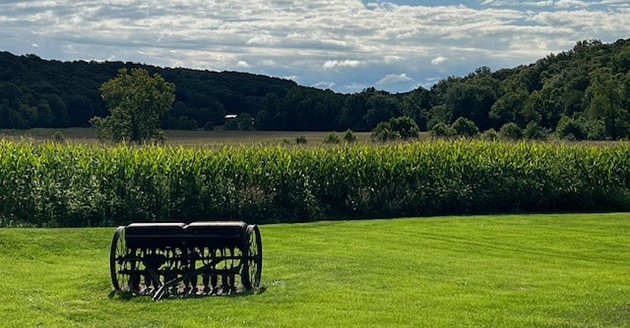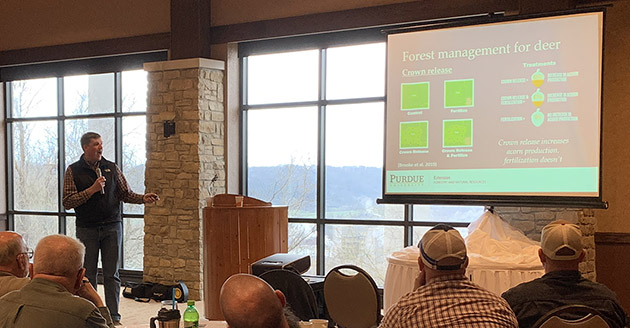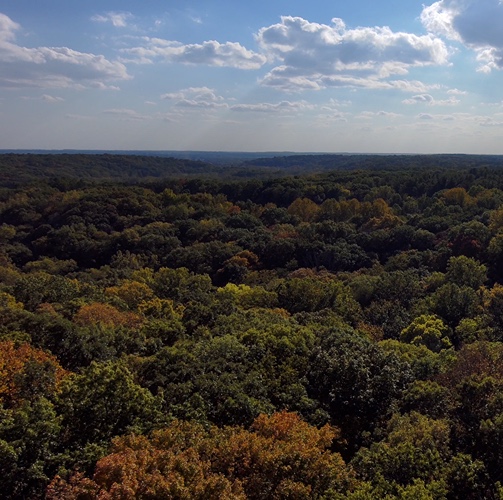Purdue Forestry and Natural Resources boasts six allied research centers, each of which is directed by FNR faculty members. These centers make a significant impact on FNR research and Purdue Extension outreach. A brief look at the 2020 accomplishments and newsworthy items from each center is below.
Center for Global Soundscapes
Director: Dr. Bryan Pijanowski
The Discovery Park Center for Global Soundscape’s mission is to support discovery, learning and engagement activities that lead to the preservation of the Earth’s natural acoustic heritage.
The Discovery Park Center for Global Soundscapes (CGS) continued its groundbreaking work in the area of soundscape ecology by advancing several unique projects in 2020.
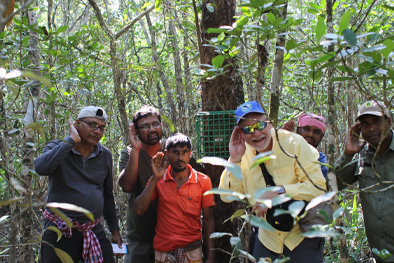 Its longest-term project, the Mission to Record the Earth, has focused on conducting at least one scientific research project at each of the world’s 31 major ecosystems. In 2020, they launched a new project in their 27th ecosystem (four more to go!), in the Sundarbans of Bangladesh, a UNESCO World Heritage Site. The planet’s largest intact mangrove ecosystem in the world, a set of passive acoustic sensors were deployed within a current long-term forest diversity research project being conducted by faculty in the Department of Forestry and Environmental Sciences at the Shahjala University of Science and Technology (SUST) in Sylet, Bangladesh. The objective of the joint Purdue-SUST study is to determine how faunal and tree diversity change across the mangrove ecosystem as it naturally varies from lower to upper estuarine locations. Part of the study is to assess how the withdrawal of fresh water from upland watersheds is altering biodiversity in portions of the mangrove ecosystem. Long-term (2+ years) recordings will be assessed for animal acoustic diversity and then associated with the forest inventories being conducted by SUST. We are hoping to hear the gruff roar of the famous Bengal Tiger, which lives in these mangroves. One acoustic recorder was also set up with a hydrophone to record temporal changes in the fish and marine mammal community located at one of the park’s dolphin protected areas. CGS is also pleased to report new funding was acquired from the United States Fish and Wildlife Service (Central Florida), National Science Foundation’s Coupled
Its longest-term project, the Mission to Record the Earth, has focused on conducting at least one scientific research project at each of the world’s 31 major ecosystems. In 2020, they launched a new project in their 27th ecosystem (four more to go!), in the Sundarbans of Bangladesh, a UNESCO World Heritage Site. The planet’s largest intact mangrove ecosystem in the world, a set of passive acoustic sensors were deployed within a current long-term forest diversity research project being conducted by faculty in the Department of Forestry and Environmental Sciences at the Shahjala University of Science and Technology (SUST) in Sylet, Bangladesh. The objective of the joint Purdue-SUST study is to determine how faunal and tree diversity change across the mangrove ecosystem as it naturally varies from lower to upper estuarine locations. Part of the study is to assess how the withdrawal of fresh water from upland watersheds is altering biodiversity in portions of the mangrove ecosystem. Long-term (2+ years) recordings will be assessed for animal acoustic diversity and then associated with the forest inventories being conducted by SUST. We are hoping to hear the gruff roar of the famous Bengal Tiger, which lives in these mangroves. One acoustic recorder was also set up with a hydrophone to record temporal changes in the fish and marine mammal community located at one of the park’s dolphin protected areas. CGS is also pleased to report new funding was acquired from the United States Fish and Wildlife Service (Central Florida), National Science Foundation’s Coupled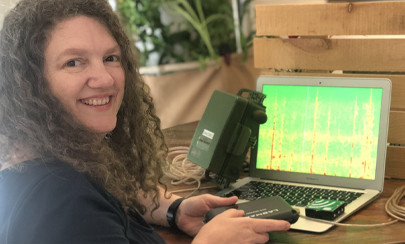 Natural Human Systems program (Mongolia), Purdue Shah Innovation Labs (India), and the NASA Biodiversity Program (Tanzania, Colombia and Canada).
Natural Human Systems program (Mongolia), Purdue Shah Innovation Labs (India), and the NASA Biodiversity Program (Tanzania, Colombia and Canada).- Pijanowski and post-doctoral research associate Dr. Kristen Bellisario’s proposal regarding “Sensor technologies for real-time monitoring of mosquito populations through heat maps in India” was selected as one of four to receive the 2020 Shah Family Global Innovation Lab Seed Grant.
- Pijanowski also received two rounds of funding from the
U.S. Fish and Wildlife Service to provide bioacoustic and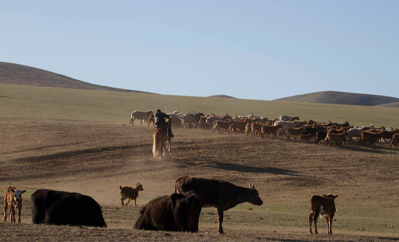 soundscape ecology support for the USFWS Avian Acoustic Monitoring Project.
soundscape ecology support for the USFWS Avian Acoustic Monitoring Project. - Pijanowski also is part of a multi-disciplinary effort to study the relationships Mongolian herders have with their landscapes through the lens of sound. His team of ecologists, social scientists and ethnomusicologists, received $750,000 from the National Science Foundation for the four-year project.
- The Tipping Point Planner Team, a collaborative effort between Illinois-Indiana Sea Grant and Purdue Extension, received the 2020 College of Agriculture TEAM (Together Everyone Achieves More) Award. The team also was recognized by the National Oceanic and Atmospheric Administration (NOAA) in its 2019 Science Report. Pijanowski, professor of landscape and soundscape ecology; Kara Salazar, assistant program leader and extension specialist for sustainable communities; Lydia Utley, data analyst; and Daniel Walker, community planning extension specialist, are the project leaders for the Tipping Point Planner.
Hardwood Tree Improvement and Regeneration Center
Director: Dr. Matt Ginzel
The mission of the HTIRC is to advance the science and application of tree improvement, management, and protection of hardwood forests, with emphasis in the Central Hardwood Forest Region (CHFR).
2020 Annual Report: Coming soon to HTIRC Annual Report
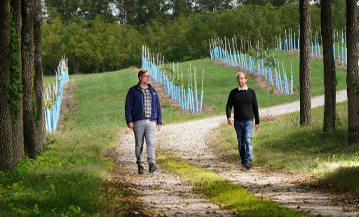 Through its project-based funding model, HTIRC has continued to support seven existing projects and also funded six new projects. Titles and more information on these projects can be found in the center’s 2019 annual report. New projects for 2020 included:
Through its project-based funding model, HTIRC has continued to support seven existing projects and also funded six new projects. Titles and more information on these projects can be found in the center’s 2019 annual report. New projects for 2020 included:
- Economic analysis of growth & yield and thinning decisions on hardwood plantations
- Development of micropropagation and regeneration system for black walnut
- Precise quantification of forest disturbances with UAS (iDiF)
- Using remote sensing to characterize stress epidemiology in hardwood forest stands (iDiF)
- A new, faster, cheaper and easier way to measure HTIRC plantations (iDiF)
- Geo-referenced and imaged-assisted in-situ biometric evaluation tool for precision growth and yield modeling (iDiF)
- The annual meeting of HTIRC will be held in October 2021. We are hopeful that this will be an in- person meeting and looking forward to seeing our stakeholders, partners, researchers, students, and staff.
- HTIRC at Purdue was awarded a third round of funding for Phase III CAFS (Center for Advanced Forestry Systems). This is a National Science Foundation Industry/University Cooperative Research Center that was established in 2006 to address challenges facing the wood products industry, landowners, and managers of the nation’s forestland.
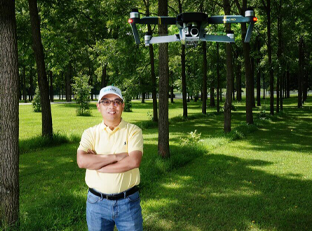 Dr. Songlin Fei, a faculty member at Purdue and HTIRC project investigator, was named the Dean’s Chair of Remote Sensing in August of 2020. More information can be found here: Purdue names Songlin Fei Dean’s Chair of Remote Sensing
Dr. Songlin Fei, a faculty member at Purdue and HTIRC project investigator, was named the Dean’s Chair of Remote Sensing in August of 2020. More information can be found here: Purdue names Songlin Fei Dean’s Chair of Remote Sensing- Due to the pandemic the 2020 HTIRC Annual Meeting was successfully held in a virtual format. Over 40 stakeholders, partners, researchers, students and staff attended the meeting. The Annual Meeting is a great opportunity for networking and a way to get feedback on how the center is advancing the mission of the HTIRC. The presentations during the meeting show how the HTIRC is addressing the research, extension and education objectives in our strategic plan.
Illinois-Indiana Sea Grant
Director: Dr. Tomas Hook
With climate change upon us, as well as a host of other concerns, such as population growth, aquatic invasive species, contaminated waters, and loss of natural habitat, the southern Lake Michigan region faces many challenges. Illinois-Indiana Sea Grant (IISG), with its unique mandate to bring the latest science to those who can best use the information, serves a critical role in empowering people to solve problems in sustainable ways.
Like everyone, Illinois-Indiana Sea Grant (IISG) has worked to adapt in 2020.
- IISG developed initiatives to help aquaculture producers and charter fishermen find new ways to be successful.
- Sea Grant helped teachers pivot to online learning with new resources and opportunities, including the Scientist to Student program that uses video chats to bring scientists into students’ homes to talk about the Great Lakes and related science.
- In 2020, IISG’s podcast, Teach Me About the Great Lakes, kicked into high gear. As the year took its many turns, Dr. Stuart Carlton worked to make the conversations relevant to our lives. He talked to experts about spending time in nature while we live with the threat of COVID-19 and actively brought a more diverse group of Great Lakes scientists into the podcast conversations.
- Late in the year, IISG, together with Purdue Extension and the university’s Department of Forestry
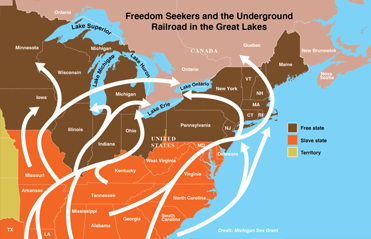 and Natural Resources, launched a new podcast series. Dr. Mitch Zischke and Megan Gunn are co-hosting Pond University, covering related topics such as habitat, fish stocking, vegetation control and construction, and will feature conversations with aquatic scientists, landowners and pond professionals.
and Natural Resources, launched a new podcast series. Dr. Mitch Zischke and Megan Gunn are co-hosting Pond University, covering related topics such as habitat, fish stocking, vegetation control and construction, and will feature conversations with aquatic scientists, landowners and pond professionals. - Related to another issue of elevated concern, Sea Grant hosted a series of workshops for resource managers and community leaders in the southern Lake Michigan region to discuss the lake’s record-breaking high water level and
extreme water level variability in the last decade. The group ended the meetings with enthusiasm for further discussion and a list of available and needed resources. - A new study carried out by three Sea Grant scientists, including our Carolyn Foley, found that Sea Grant-supported research is consistently published in high quality journals and is frequently cited in local, regional and international publications.
- IISG’s Megan Gunn was part of a committee that put together
a Freedom Seekers curriculum that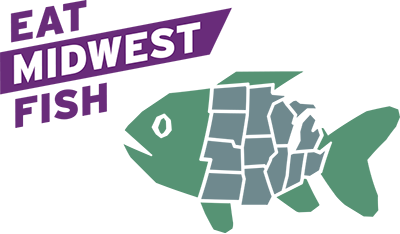 connects students to the Underground Railroad, Great Lakes and science.
connects students to the Underground Railroad, Great Lakes and science. - IISG created the Eat Midwest Fish website to provide people with tools to make incorporating fish into their diet easier. The website includes a fish finder map, recipes, how-to cooking videos, nutrition information an introduction to aquaculture and more.
The mission of the IWRRC is to coordinate the intellectual and physical resources of Indiana’s universities, state agencies, and industries to resolve technical, economic, and other problems associated with water resources management, use, and preservation. The IWWRC supports research by administering the section 104B program for the state of Indiana.
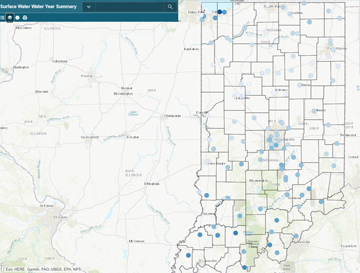 Awarded six grants to researchers from Indiana University, IUPUI, Indiana State University, Ball State University, and Purdue University
Awarded six grants to researchers from Indiana University, IUPUI, Indiana State University, Ball State University, and Purdue University- Awarded 1 conference presentation/travel grant to a post-doc at Purdue
- Received a 104G National Competitive Grant awarded to Dr. Gary Lamberti at the University of Notre Dame. Project Title: Per- and Polyfluoroalkyl Substances (PFAS) – An Emerging Environmental and Human Health Concern for the Great Lakes?
- Received a 104G Aquatic Invasive Species National Competitive Grant awarded to Dr. Paul Venturellli at Ball State University. Project title: Using data from a popular fishing app to predict the spread of aquatic invasives and identify characteristics of resistant/resilient lakes in the Upper Mississippi River Basin
- Director, Dr. Linda Prokopy, was awarded the Faculty Unsung Diversity Hero award for the College of Agriculture
- The State of Indiana Waters website was updated with data for the current water year and released as a part of the New Water Year Celebration
Purdue Climate Change Research Center
The Purdue Climate Change Research Center (PCCRC) facilitates interdisciplinary climate change research, education, and engagement. The center supports climate change research at Purdue to improve understanding of the causes and consequences of the Earth’s changing climate system and enhance the capacity of decision makers to develop effective mitigation and adaptation strategies.
2020 Annual Report
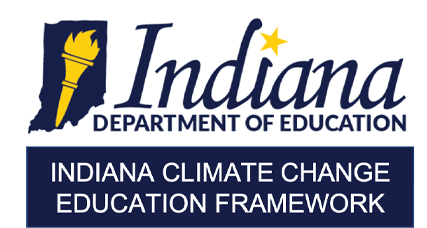 The Purdue Climate Change Research Center partnered with the Indiana Department of Education (IDOE) and Purdue Science's K-12 Outreach to curate resources that both assist educators with teaching climate change and intersect with existing Indiana Academic Standards for science.
The Purdue Climate Change Research Center partnered with the Indiana Department of Education (IDOE) and Purdue Science's K-12 Outreach to curate resources that both assist educators with teaching climate change and intersect with existing Indiana Academic Standards for science. The PCCRC partnered with Purdue Extension and the Indiana State Climate Office on a six-part virtual training series designed to familiarize Indiana educators and professionals with foundational
knowledge about climate change.
knowledge about climate change.
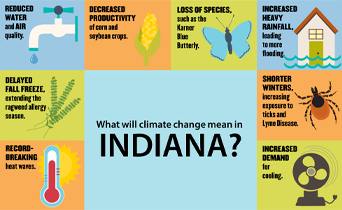 The PCCRC hosted a series of research conversations to spark new ideas and collaborations. Through six real-time virtual webinars, the Center shared the research efforts of its affiliates with the campus community.
The PCCRC hosted a series of research conversations to spark new ideas and collaborations. Through six real-time virtual webinars, the Center shared the research efforts of its affiliates with the campus community.The PCCRC added eight new faculty affiliates to its ranks: Peter Bermel (Electrical Engineering), Tara Grillos (Political Science), Beth Hall (Indiana State Climate Change Office), Yiwei Huang (Horticulture and Landscape Architecture), Erik Otárola-Castillo (Anthropology), Marissa Tremblay and Lei Wang (Earth, Atmospheric and Planetary Sciences) and Brock Harpur (Entomology).
PCCRC director Jeff Dukes was quoted in the Washington Post article, "What the coronavirus can teach us about fighting climate change.”
Dukes served as a member of the U.S. Commodity Futures Trading Commission's climate risk subcommittee. He co-authored a new report “Managing Climate Risk in the U.S. Financial System”
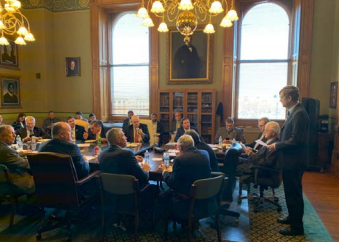 that warns of the emerging risks climate change poses to the U.S. financial system.
that warns of the emerging risks climate change poses to the U.S. financial system.
 that warns of the emerging risks climate change poses to the U.S. financial system.
that warns of the emerging risks climate change poses to the U.S. financial system. Dukes also was a guest speaker at the Indiana Statehouse, presenting on “Water Resources in Indiana: Impacts of Climate Change.” He also gave testimony to the Indiana Legislature’s Agriculture and Natural Resources Summer Study Committee
on the prospects for incentivizing additional carbon storage in Indiana’s forests and agricultural soils as part of a proposed state-run carbon credit program.
on the prospects for incentivizing additional carbon storage in Indiana’s forests and agricultural soils as part of a proposed state-run carbon credit program.
Tropical Hardwood Tree Improvement and Regeneration Center
Director: Dr. Doug Jacobs
The Tropical HTIRC mission is to advance the science and application of tree improvement, management, and protection to improve tropical hardwood forests, with emphasis on the Hawaiian Islands.
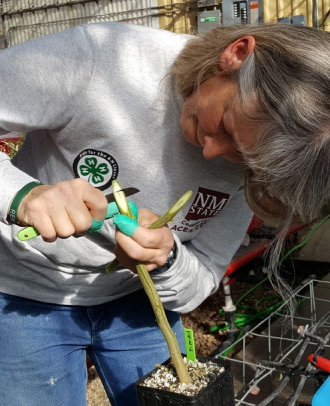 The Tropical HTIRC hosted its annual advisory committee meeting in December 2019 in Honolulu. The committee provides guidance on the strategic directions of the center, prioritization of research themes, and staffing.
The Tropical HTIRC hosted its annual advisory committee meeting in December 2019 in Honolulu. The committee provides guidance on the strategic directions of the center, prioritization of research themes, and staffing.TropHTIRC had several projects in process in 2020: koa cold tolerance; koa population ecophysiology; koa seed scarification; koa breeding for fusarium wilt resistance; koa grafting; koa seed collection; community-based forest management; bird-mediated forest restoration; ‘iliahi biology, ecology and management, ‘ōhi’a disease resistance; and chemical ecology of rapid ‘ōhi’a death.
TropHTIRC research produced two major publications in 2020: Canopy openness affects microclimate and performance of underplanted trees in restoration of high-elevation tropical pasturelands and Nursery cultural techniques facilitate restoration of Acacia koa competing with invasive grass in a dry tropical forest.
In 2020, two TropHTIRC graduate students successfully defended their master’s theses: Lilian Ayala Jacobo (Purdue) and Achyut Adhikari (Hawaii-Manoa). Ayala Jacobo is now a research forester at the Paraguayan Institute of Agricultural Technology. Adhikari is planning to pursue a Ph.D.
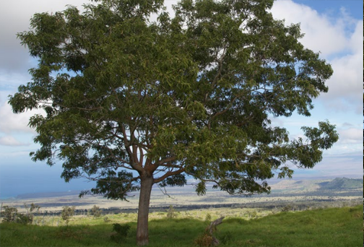 TropHTIRC recruited two new students, born and raised in Hawai’i, into graduate studies at Purdue: Tawn Speetjens and Kylle Roy. Speetjens is studying ‘iliahi nursery propagation and restoration planting in collaboration with Hāloa ‘Āina for his master’s degree. Roy is studying the chemical ecology of beetles, fungi and ‘ōhi’a trees in association with Rapid ‘Ōhi’a Death for her PhD. Roy was awarded a Sloan Scholar to pursue her doctorate degree through the Sloan Foundation Indigenous Graduate Partnership.
TropHTIRC recruited two new students, born and raised in Hawai’i, into graduate studies at Purdue: Tawn Speetjens and Kylle Roy. Speetjens is studying ‘iliahi nursery propagation and restoration planting in collaboration with Hāloa ‘Āina for his master’s degree. Roy is studying the chemical ecology of beetles, fungi and ‘ōhi’a trees in association with Rapid ‘Ōhi’a Death for her PhD. Roy was awarded a Sloan Scholar to pursue her doctorate degree through the Sloan Foundation Indigenous Graduate Partnership.Bee Redfield began her Ph.D. program in January 2020. She is studying the role that birds play in forest restoration, the way that forest restoration impacts native bird populations and how to maximize the effectiveness of both through management strategies.
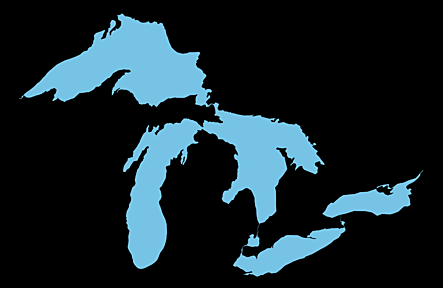 For
For 